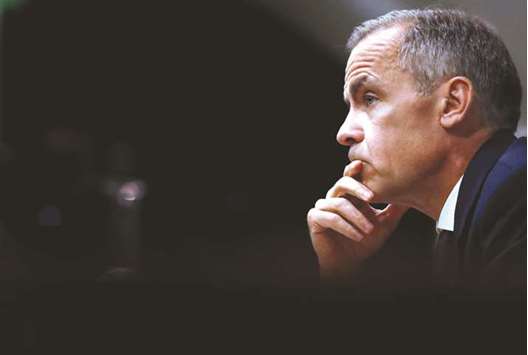Mark Carney says Brexit will continue to take a toll on UK investment and growth, and the Bank of England’s assumption of an orderly divorce from the European Union will be put to the test.
The BoE governor’s comments come after signs of slow progress in the initial round of exit talks as well as government squabbling after a poor election result in June. The central bank cut its forecasts for economic growth and wages and kept its benchmark rate at a record low. The predictions continue to assume a smooth Brexit and are based on a rate hike fully priced in by the third quarter of 2018.
The bank’s latest forecasts factor in “uncertainty about the eventual shape of the UK’s economic relationship with the EU,” which “weighs on the decisions of businesses and households and pulls down both demand and supply,” Carney said at a press conference yesterday, speaking after the BoE’s policy announcement.
As the Brexit negotiations proceed, “the assumption of a smooth transition to a new economic relationship with the EU will be tested,” he said. The central bank now projects economic growth of 1.7% this year and 1.6% in 2018, down from 1.9% and 1.7%. The downgrades were enough for the majority of the Monetary Policy Committee to keep their cautious stance, with the vote for no change coming in as expected at 6-2.
Ian McCafferty and Michael Saunders maintained their push for a 25 basis-point increase, which would reverse the rate cut put in place a year ago this week. The British government has until March 2019 to negotiate its divorce and a new trade deal with the EU, or a transition to that new relationship. Talks are on hold until the end of August, though they’ve been off to a rocky start, with both sides clashing on issues which must be resolved before negotiations can turn to trade.
Carney said that at the moment, the bank does “not see any material evidence” that businesses “think that the transition would be anything but smooth.”
The new forecasts reflect the deterioration of the economic outlook since May as faster inflation outpaces wage gains, holding back consumer spending. While the bank sees the weaker pound and stronger global growth bolstering exports, uncertainty surrounding the UK’s talks to leave the EU is creating a drag.

Bank of England governor Mark Carney addresses journalists during a press conference to deliver the quarterly inflation report in London yesterday. The central bank now projects UK economic growth of 1.7% this year and 1.6% in 2018, down from 1.9% and 1.7%.
